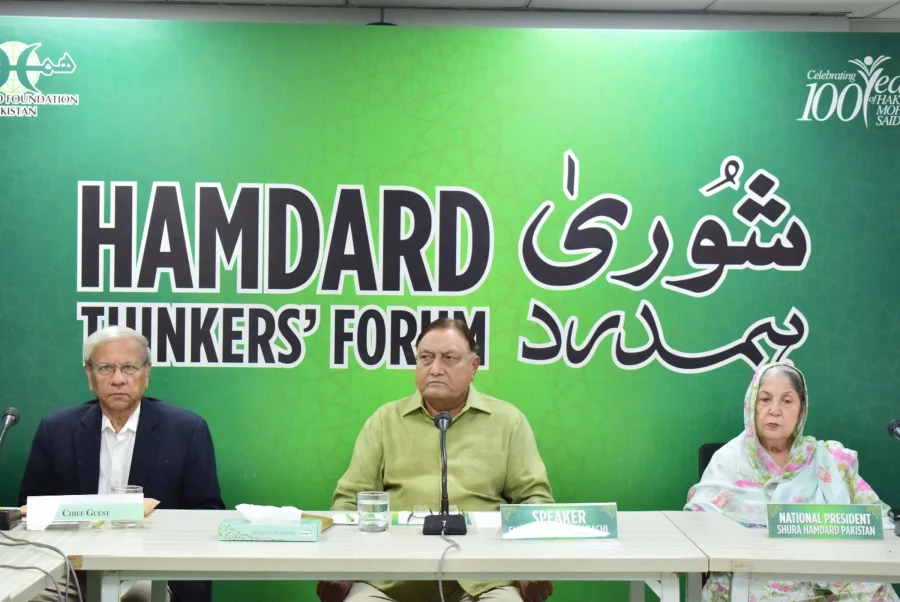Renowned economist Dr. Kaiser Bengali said that there is the need for a national consensus among all stakeholders on the country’s defence, diplomatic, and economic goals and interests. He noted that developed countries have a national consensus on sustaining economic and developmental continuity. Policies remain consistent even as governments change.
Dr. Bengali made these remarks as the guest speaker at the monthly meeting of HamdardShura Karachi, held at the Hamdard Corporate Head Office, titled “Budget 2024-25: Was Justice Done to All Sectors?” Speaker General (r)MoinuddinHaider, presided over the meeting. Ms. Sadia Rashid, President of Hamdard Foundation Pakistan, also attended the meeting. In his address, Dr. Bengali stated that before 1977, there was a national consensus on the country’s economic development. However, Pakistan later took a wrong direction. The main economic issue of Pakistan is trade and budget deficits. These can only be addressed by reducing unnecessary imports and prioritizing exports. To achieve this, we need long-term policy implementation and detailed strategies to reduce expenditures and boost exports.
The recent budget provides no incentives for the poor and middle class.He further said that according to the economic survey report, all sectors in the country are declining. The economy is stagnant due to the lack of development in the manufacturing industry, which is crucial for economic growth. The budget allocates 400 billion rupees for development projects, but the source of this funding has not been specified. Efforts are being made to collect funds through privatization. During the Musharraf era, large-scale privatization occurred in various sectors, including the sale of many financial institutions. However, investors later transferred their profits out of the country, leading to negative remittances phenomenon. Following the 18th Amendment, many federal ministries were transferred to the provinces, though many ministries still exist in the federation, burdening the national budget with their civil administration costs.Esteemed members of HamdardShura, ZafarIqbal, Cdre (r) Sadeed Anwar Malik, Senator Abdul Haseeb Khan, Engr. Ibn-ul-Hassan, Col. (r) Mukhtar Ahmed Butt, Dr. AmjadJafri, Prof. Dr. Tanveer Khalid and Amir Tauseen said that the biggest issue for the poor and middle class is inflation.
A person earning 30,000 rupees pays the same price for petrol as someone earning 3 million rupees per month. The prices of electricity, petrol, and essential commodities should be adjusted according to the buyer’s purchasing power to minimize the burden on the lower income households. Subsidies are given so that the price difference is covered by the government, ensuring that producers’ incomes are not affected and goods remain affordable for the middle class. The current situation requires a comprehensive, multi-faceted economic policy to address this critical issue.The interest groups have monopolized each sector through collusion and protect their interests through the power corridors.
The entire system is controlled by a few influential individuals. The primary role of industrialists is to create employment, which is why the government offers them incentives. Sadly, the nation’s entrepreneurial potential has not been nurtured. That is why there are very few technological startups taking place in the country, resulting little or no new job opportunities for young human resource. Benefiting privileged classes in the budget that do not contribute to national exports is a disservice to the country and its people.
Every employed Pakistani should pay income tax regardless of their sector. Without this legislation, the tax net cannot expand. Non-filers should face stricter enforcement. The income tax payment process should be simplified for ordinary people, and electronic money transfers should be promoted to reduce the size of cash economy. The real estate sector is a major cause of inflation, with property prices driven up by speculation. Money that should be invested in industries is instead invested in property projects. International financial institutions, including the IMF, are influenced by global politics and make decisions based on the interests of world powers.










